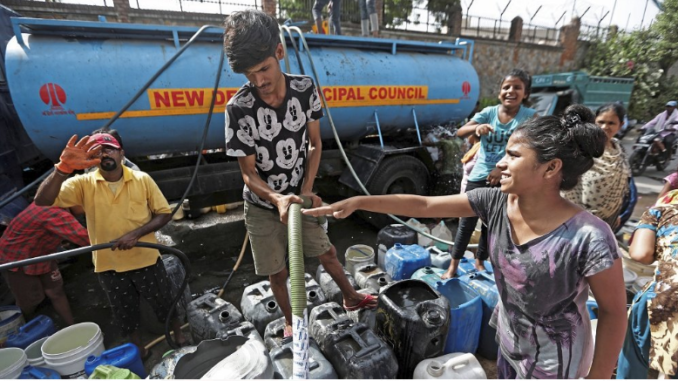
In drought-hit Delhi, the haves in the center get limitless water while the poor on the outskirts fight for every drop
In this teeming capital city of more than 20 million people, a worsening drought is amplifying the vast inequality between India’s rich and poor.
The politicians, civil servants and corporate lobbyists who live in substantial houses and apartments in central Delhi pay very little to get limitless supplies of piped water – whether for their bathrooms, kitchens or to wash the car, dog, or spray a manicured lawn. They can do all that for as little as $10-$15 a month.
But step into one of the slum areas in the inner city, or a giant disorganized housing estate on the outskirts and there is a daily struggle to get and pay for very limited supplies of water, which is delivered by tanker rather than pipe.
And the price is soaring as supplies are fast depleting.
India’s water crisis is far from even-handed – the elite in Delhi and most other parts of the country remain unaffected while the poor scramble for supplies every day. Prime Minister Narendra Modi’s official residence and those of his cabinet are in central Delhi, as are those of most lawmakers.
That may help to explain why it took until last week for Modi to call for a massive water conservation program, the first big initiative by the government despite years of warnings about dry reservoirs and depleted water tables, policy makers and water industry experts said.
Delhi’s main government district and the army cantonment areas get about 375 liters of water per person per day but residents of Sangam Vihar on average receive only 40 liters for each resident per day.
The water comes from boreholes and tankers under the jurisdiction of the Delhi water board, run by the city government.
But residents say some of the boreholes have been taken over by private operators associated with criminal gangs and local politicians. These gangs also have a major role in providing private tankers, which are illegal, making people liable to price gouging.
And all this when temperatures, and demand, are soaring. Delhi was the second driest it has been in 26 years in June, and recorded its highest ever temperature for the month at 48 degrees Celsius on June 10. Most private tanker operators in Delhi either illegally pump out fast depleting ground water or steal the water from government supplies.
In Delhi, nearly half of the supply from the Delhi water board either gets stolen with the connivance of lowly officials or simply seeps out via leaky pipes, studies show.
The board’s 1,033 tanker fleet is well short of the city’s requirements. Hundreds of private water tankers are operating this summer, though there are no official numbers.
REUTERS
SLOVÍČKA
drought sucho, období sucha
the haves majetní, bohatí
outskirts předměstí, periferie
teem hemžit se, tlačit se
amplify zesílit, zvětšit
civil servant státní úředník
substantial masivní, robustní
manicured pečlivě střižený
housing estate sídliště
tanker cisterna
pipe potrubí, trubka
soar prudce stoupat
deplete ubývat, ztenčovat se
even-handed spravedlivý
scramble přetahovat, prát se
lawmaker zákonodárce
water table hladina podzemní vody
borehole vrt, vrtná sonda
liable vystavený, trpící
gouging vydírání, okrádání
connivance tichý souhlas
lowly níže postavený (o funkci)
seep prosakovat, unikat
leaky děravý, netěsný
be short of mít nedostatek
V dnešním článku se vyskytl výraz se zápornou předponou ve větě „…most other parts of the country remain unaffected…“. („…většina dalších částí země zůstává nepostižena…“). Pomocí záporných předpon tvoříme slova opačného významu. Pro některé předpony existují pravidla, která však neplatí vždy. Pro slova začínající na r použijeme ir- (irresponsible – nezodpovědný). Pro slova začínající na l použijeme il- (illegal – nelegální). Pro slova začínající na m a p použijeme im- (immature – nevyspělý, impatient – netrpělivý). Dalšími předponami jsou un- (uncommon – neobvyklý), in- (invali – neplatný), dis- (dishonest – nečestný).
Zvolte předponu ir-, il-, im-, un-, in-, dis-:
healthy, pleased, direct, logical, regular, mortal, practical
Řešení: unhealthy, displeased, indirect, illogical, irregular, immortal, impractical
zdroj LN
